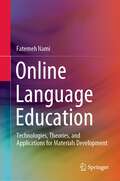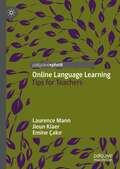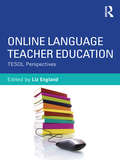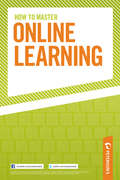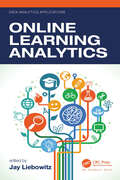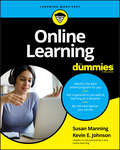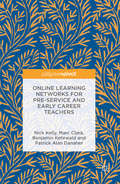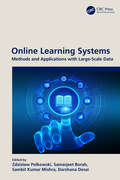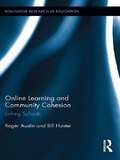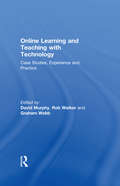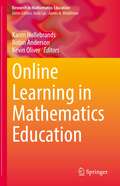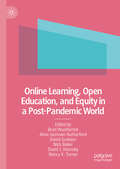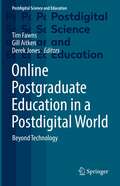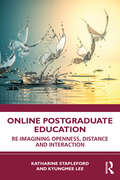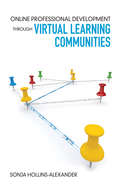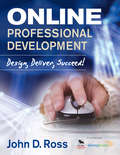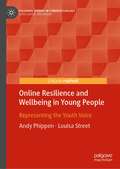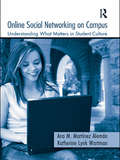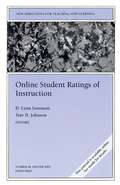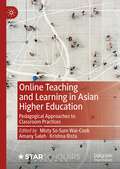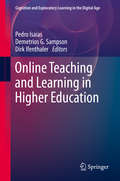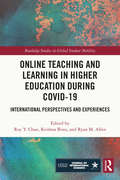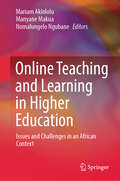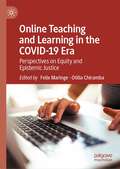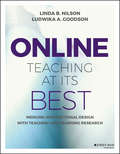- Table View
- List View
Online Language Education: Technologies, Theories, and Applications for Materials Development
by Fatemeh NamiThis book addresses the gap between Computer-Assisted Language Learning (CALL) materials development and its theoretical considerations by offering a comprehensive look into theory, practice, and research on materials development and content authoring for language instruction/practice, drawing on the author’s personal experiences along with previous empirical/theoretical research in CALL materials development, content authoring, language teacher education, and e-learning. The book features four sections. In addition to highlighting related theoretical underpinnings, key concepts, linguistic-didactic functionalities and interaction scenarios in materials development, the volume will address the practical issues and considerations not only in the design, development, integration, and evaluation of the technology-enhanced materials development for language instruction but also the protection, usability, and access in authored and/or co-authored content. Furthermore, previous research findings and foci are addressed to highlight the research gaps and pedagogical implications for materials developers, policy makers, and language teachers. The book can help teachers, educators, and researchers overcome the aforementioned problem by providing a step-by-step guideline on how to effectively integrate technology and design and develop instructional materials for online language instruction and practice.
Online Language Learning: Tips for Teachers
by Jieun Kiaer Laurence Mann Emine ÇakırThis book provides tips and guidelines for teachers and learners of modern foreign languages in higher education institutions, drawing on the authors' experiences of teaching languages including Turkish, Japanese and Korean to suggest strategies and approaches that promote effective use of the online environment. As well as shedding light on modern languages that are typically under-studied and under-represented in the literature, this book demonstrates how the online sphere is increasingly fundamental to language use, change and contact. The authors provide practical guidance to help teachers and learners capitalise on the opportunities presented by a virtual educational context, and offer a more resilient blended approach that will increase teachers' and students' preparedness for changing circumstances and institutional priorities in the future. This book is primarily aimed at teachers and students of foreign languages within HE settings, but its focus on new perspectives will also be of interest to scholars researching the online shift in language education, applied linguistics, curriculum design and educational technology.
Online Language Teacher Education: TESOL Perspectives
by Liz EnglandMore and more, ESL/EFL teachers are required by their employers to obtain a Master’s degree in TESOL. Thousands of ESL/EFL teachers are acquiring professional skills and knowledge through online and distance education instructional models. Filling a growing need and making an important contribution, this book is a forerunner in addressing some of the issues and problems for online distance learning and instructional delivery in TESOL and applied linguistics departments in universities around the world. Carefully addressing the complexity of the field, this volume includes primary research and case studies of programs where a variety of online distance models are used. Structured in a logical sequence, the readable and accessible content represents the collected expertise of leading language teacher educators. Each chapter brings the reader a better understanding and ability to apply knowledge about online distance TESOL education.
Online Learning
by Peterson'sHow to Master Online Learning provides information about online degree programs, online certifications, and continuing education; advice on paying for online classes, software, and textbooks; and expert strategies for online learning success. Online learning continues to grow and evolve as the most popular form of distance learning. For the most comprehensive online learning guidance, including tips on making the most of your online learning experience, choose Peterson's How to Master Online Learning.
Online Learning Analytics (Data Analytics Applications)
by Jay Liebowitz"In our increasingly digitally enabled education world, analytics used ethically, strategically, and with care holds the potential to help more and more diverse students be more successful on higher education journeys than ever before. Jay Liebowitz and a cadre of the fields best ‘good trouble’ makers in this space help shine a light on the possibilities, potential challenges, and the power of learning together in this work." —Mark David Milliron, Ph.D., Senior Vice President and Executive Dean of the Teachers College, Western Governors University Due to the COVID-19 pandemic and its aftereffects, we have begun to enter the "new normal" of education. Instead of online learning being an "added feature" of K–12 schools and universities worldwide, it will be incorporated as an essential feature in education. There are many questions and concerns from parents, students, teachers, professors, administrators, staff, accrediting bodies, and others regarding the quality of virtual learning and its impact on student learning outcomes. Online Learning Analytics is conceived on trying to answer the questions of those who may be skeptical about online learning. Through better understanding and applying learning analytics, we can assess how successful learning and student/faculty engagement, as examples, can contribute towards producing the educational outcomes needed to advance student learning for future generations. Learning analytics has proven to be successful in many areas, such as the impact of using learning analytics in asynchronous online discussions in higher education. To prepare for a future where online learning plays a major role, this book examines: Data insights for improving curriculum design, teaching practice, and learning Scaling up learning analytics in an evidence-informed way The role of trust in online learning. Online learning faces very real philosophical and operational challenges. This book addresses areas of concern about the future of education and learning. It also energizes the field of learning analytics by presenting research on a range of topics that is broad and recognizes the humanness and depth of educating and learning.
Online Learning For Dummies
by Susan Manning Kevin E. JohnsonIdentify the best online program for you Get organized to succeed at learning at a distance Be the best learner you can be Get your best education online Whether you're a college student, adult learner, or professional in continuing education, some—and sometimes all—of your learning will happen in a virtual classroom. This book is your friendly guide to the fast-growing possibilities of this world, from choosing the right course and mastering the software to polishing up your online communication and study skills. Whatever you want from your study experience—school success, professional development, or just pursuing your passion—this is your road map to online educational success! Inside... Find the right course for you Prep successfully for classes Manage time online Apply for study funding Transfer credits Master the software Get the right hardware Develop online etiquette
Online Learning Networks for Pre-Service and Early Career Teachers
by Nick Kelly Marc Clarà Benjamin Kehrwald Patrick Alan Alan DanaherHow can we improve support for teachers as they negotiate the pathways into the profession? This books highlights how strong networks of connections with other teachers and with resources have been shown to make a big difference. Online learning networks are one way to help pre-service and early career teachers to foster these connections and the greater community of teachers has an interest in helping new teachers to enter the profession. New technologies have allowed teachers to be connected anywhere, anytime; this book discusses principles for the design and implementation of learning networks that can use this connectivity to improve support for beginning teachers. It addresses foundational principles of types of teacher communities (online and offline), types of knowledge relevant to beginning teachers, the idea of presence within a network and methodologies for studying and nurturing communities of teachers, providing recent examples of each.
Online Learning Systems: Methods and Applications with Large-Scale Data
by Samarjeet Borah Zdzislaw Polkowski Sambit Kumar Mishra Darshana DesaiThis book discusses the newest approach to online learning systems in higher education. As e-Learning platforms change their mechanisms for data processing and storage, there is a need to move these systems toward being more efficient and smarter. This book covers online learning systems and their application to large-scale data along with the technological aspects of these processes and problem-solving methods. Online Learning Systems: Methods and Applications with Large-Scale Data discusses the efficiency measurement and environmental impact of online education. The book offers a parametric evaluation and categorization of online learning systems and provides an exploration of big data ecosystems in cloud computing. Descriptive analytical methods that assist in finding solutions for big data challenges are also covered within the book. The book is written for academicians, which includes teachers, students, and higher education policymakers who believe in transforming the education industry, as well as research scholars and those working in education technology and artificial intelligence. Industry professionals involved in education management and those working in e-Learning companies will also find this book useful.
Online Learning and Community Cohesion: Linking Schools (Routledge Research in Education #98)
by Roger Austin Bill HunterNational governments and multi-national institutions are spending unprecedented amounts of money on ICT on improving the overall quality of school learning, and schools are increasingly expected to prepare young people for a global economy in which inter-cultural understanding will be a priority. This book explores and analyzes the ways ICT has been used to promote citizenship and community cohesion in projects that link together schools in different parts of the world. It examines the theoretical framework behind such work and shows the impact of initiatives in the Middle East, Canada, the USA, England, Northern Ireland, the Republic of Ireland and elsewhere in the European Union. This is a critical examination of the technologies that have been deployed, the professional development that has been provided and an evaluation of what constitutes good practice, particularly in terms of what collaborative learning really means for young people. Many of these initiatives have enabled young people to develop more positive relations with culturally and religiously different neighbours, but this work has just begun. Continuing international tensions over matters of identity and faith require that we better understand the political context for such work so that we might shape future directions more deliberately and more clearly.
Online Learning and Teaching with Technology: Case Studies, Experience and Practice
by Rob Walker David Murphy Graham WebbIn the 21st century technology has become an essential part of teaching and learning. This manual provides practical advice on teaching in a wide range of technologies, including the internet and multimedia packages. Using case studies to illustrate the key concepts, this book aims to promote student learning and understanding, and show educators how to use technology to motivate learners and encourage productive interaction.
Online Learning in Mathematics Education (Research in Mathematics Education)
by Kevin Oliver Robin Anderson Karen HollebrandsThis book brings together research from mathematics education and instructional design to describe the development and impact of online environments on prospective and practicing teachers’ learning to teach mathematics. The move to online learning has steadily increased over the past decade. Its most rapid movement occurring in 2020 with most instruction taking place remotely. Chapters in this book highlight issues related to teacher learning in three main contexts: formal, informal, and experiential or practice-based. This volume brings together researchers from the different but related fields of instructional design and mathematics education to engage in dialogue around how we design and study the impacts of online learning in general and online mathematics education more specifically. The book is very timely with most instruction taking place online and mathematics educators addressing challenges related to supporting teachers’ formal, informal, and experiential learning online. A chapter in each section will synthesize ideas presented by instructional designers and mathematics educators as it relates to teacher learning in each context. At the end of each section, a retrospective chapter is presented to reflect on what the different perspectives offer to better understand mathematics teacher learning in online environments. This book is of interest to mathematics educators, researchers, teacher educators, professional development providers, and instructional designers.
Online Learning, Open Education, and Equity in a Post-Pandemic World
by Nick Baker David J Hornsby David Graham Aline Germain-Rutherford Brad Wuetherick Nancy K. TurnerThis edited volume explores institutional responses, equity in open education, and the future of higher education in a post-pandemic world, offering valuable insights into effective pedagogical practices and policy recommendations to sustain the advancements made during the pandemic. Through providing a concise overview of the collective insights and responses from various educational institutions and educators worldwide to the unprecedented challenges posed by the COVID-19 pandemic on higher education. It underscores the substantial shift to online learning, highlighting the exacerbation of existing inequalities among students due to factors such as digital access, socioeconomic status, and disabilities.
Online Postgraduate Education in a Postdigital World: Beyond Technology (Postdigital Science and Education)
by Derek Jones Gill Aitken Tim FawnsThis edited volume builds upon the premise that online learning is not separate from the social and material world, and is made up of embodied, socially-meaningful experiences. It is founded on a “postdigital” perspective in which, much more than interactions with keyboards, computer screens, hardware or software, the learning that happens on online postgraduate programmes spills out into professional and informal settings, making connections with what comes before and after any formally-scheduled tasks. Unlike other books relating to online education, this book combines a theoretical perspective, in which the digital, physical and social are all interconnected within complex educational ecologies, with a focus grounded in postgraduate practice. This focus has important implications for the kinds of students and learning that are explored in the chapters of the book. This book provides an important contribution to the knowledge of what is required to produce quality, online postgraduate programmes at the level of teachers, curriculum designers, faculty developers and policy-makers.
Online Postgraduate Education: Re-imagining Openness, Distance and Interaction
by Katharine Stapleford Kyungmee LeeProviding a comprehensive examination of the nature of online higher education, this book proposes effective ways in which it can be conceptualised and designed to be more accessible and authentic for adult learners.Against the backdrop of differing historical origins, which have resulted in multiple, misaligned understandings, applications and interpretations of online and distance education, this book presents an empirical research study which uses a narrative approach to explore the lived experiences of online postgraduate students. It positions two arguments on the (in-)accessibility and (in-)authenticity of online education side by side, effectively demonstrating how they can be conflict and contradict each other. Using narrative data, the authors re-examine the concepts of distance and interaction in order to present a new understanding of the concept of openness relevant to the for-profit postgraduate distance learning sector. This book illuminates the postgraduate distance education experience and presents a set of alternative theoretically informed conceptions which the authors present as three essential pillars of online postgraduate education: openness, distance, and interaction. Carefully presented and supported using real online higher education scenarios, the book will enable higher educators, practising online education in a range of pedagogical contexts, to re-imagine their practices; further, to create more accessible and authentic learning opportunities for their learners.
Online Professional Development Through Virtual Learning Communities
by Sonja Hollins-AlexanderCreate a 21st-century professional development program! Can online learning deliver high-caliber professional development (PD) with lower costs? This timely book shows you how, and the answer lies in combining well-designed online instruction with the energy of peer-to-peer collaboration. Sonja Hollins-Alexander writes from her own experience building a successful online professional development program for a large urban district.
Online Professional Development: Design, Deliver, Succeed!
by John D. RossMuch-needed direction for navigating online professional development Online professional development expert John D. Ross’s practical framework will help you ask the right questions and make sound development and purchasing decisions. Based on proven principles of professional learning and instructional design, he guides you through charting your course to success and provides a path to answering these fundamental questions: <p><p> Why do I need OPD? <p> How much does it cost? <p> How do I get started? <p> What does high-quality online learning look like? <p> What technologies are right for me? <p> Did it work?
Online Resilience and Wellbeing in Young People: Representing the Youth Voice (Palgrave Studies in Cyberpsychology)
by Andy Phippen Louisa StreetThis book explores online resilience and safety from a new perspective, by drawing extensively upon the youth voice. While “online safety” as a concept has now existed for well over ten years, the majority of policy and narrative is driven by preventative and adultist views of ensuring safety from harm. Underpinned by extensive empirical work, this book argues that safety, or freedom from harm, is not an achievable goal and we should refocus upon harm reduction and risk mitigation. Fundamental to this argument is that the youth voice clearly states that they will not disclose, or ask adults for support, because they do not believe they will get help or worse, will be punished as a result of disclosure. The research shows that professionals often bring their own digital value biases into safeguarding decisions, and feel that they should be white knights to young people, rather than listening to them and supporting them in a non-judgemental way. The book will be of great value to researchers and students as well as practitioners, teachers and parents interested in digital resilience and safeguarding, internet security and youth online behaviour and wellbeing.
Online Social Networking on Campus: Understanding What Matters in Student Culture
by Ana M. Martínez-Alemán Katherine Lynk WartmanIn the era of such online spaces as Facebook, Instant Messenger, Live Journal, Blogger, Web Shots, and campus blogs, college students are using these resources and other online sites as a social medium. Inevitably, this medium presents students with ethical decisions about social propriety, self disclosure and acceptable behaviour. Because online social networking sites have proven problematic for college students and for college administrators, this book aims to offer professional guidance to Higher Education administrators and policy makers. Online Social Networking on Campus: Understanding what matters in student culture is a professional guide for Higher Education faculty and Student Affairs administrators, which rigorously examines college students’ use of online social networking sites and how they use these to develop relationships both on and off campus. Most importantly, Online Social Networking on Campus investigates how college students use online sites to explore and makes sense of their identities. Providing information taken from interviews, surveys and focus group data, the book presents an ethnographic view of social networking that will help Student Affairs administrators, Information Technology administrators, and faculty better understand and provide guidance to the "neomillennials" on their campuses.
Online Student Ratings of Instruction
by D. Lynn Sorenson Trav D. JohnsonThis volume examines the development and growing use of online student ratings and the potential impact online rating systems will have on the future of students' evaluations of teaching. The contributors demonstrate how the preference for online evaluation is growing, even amidst challenges and doubt. Sharing their first-hand experience as researchers and administrators of online systems, they explore major concerns regarding online student ratings and suggest possible solutions. D. Lynn Sorenson and Christian M. Reiner review existing online-rating systems that have been developed independently across the globe. Kevin Hoffman presents the results of a national survey that tracks the increased use of the Internet for student ratings of instruction. At Northwestern University, Nedra Hardy demonstrates how ongoing research about online student evaluations is helping to dispel common misperceptions. Application of online rating systems can present institutions with new challenges and obligations. Trav D. Johnson details a case study based on five years of research in the response rates for one university's online evaluation system and suggests strategies to increase student participation. Reviewing online reporting of results of online student ratings, Donna C. Llewellyn explores the emerging issues of security, logistics, and confidentiality. Other chapters explore existing online systems, highlighting their potential benefits for institution and instructor alike. Beatrice Tucker, Sue Jones, Lean Straker, and Joan Cole analyze Course Evaluation on the Web (CEW), a comprehensive online system for instructional feedback and improvement. Cheryl Davis Bullock reviews the Evaluation Online (EON) system and its successful role in facilitating midcourse student feedback. The fate of online rating may rest in the unique advantages it may - or may not - have over traditional ratings systems. Debbie E. McGhee and Nana Lowell compare online and paper-based methods through mean ratings, inter-rater reliabilities and factor structure of items. Comparing systems from another angle, Timothy W. Bothell and Tom Henderson examine the fiscal costs and benefits of implementing an online evaluation system over paper-based systems. Finally, Christina Ballantyne considers the prominent issues and thought-provoking ideas for the future of online student ratings raised in this volume. Together, the contributors bring insight and understanding to the processes involved in researching and initiating innovations in online-rating systems. This is the 96th issues of the quarterly journal New Directions for Teaching and Learning.
Online Teaching and Learning in Asian Higher Education: Pedagogical Approaches to Classroom Practices
by Krishna Bista Misty So-Sum Wai-Cook Amany SalehThis collection focuses on the challenges, lessons learned, and best teaching practices shared by educators in the higher education system in both the developed and developing areas of Asia. Organized into three sections, the book covers key factors that affect the successes of online education in Asia, including innovations in curriculum design; innovations in communicating with students; and innovations in assessments. In doing so, it provides educators important insights into the differences between teaching and learning in both the developed and developing areas of Asia and highlights the problems that still need to be addressed as technologies advance in the twenty-first century in STEM and non-STEM disciplines.
Online Teaching and Learning in Higher Education (Cognition and Exploratory Learning in the Digital Age)
by Dirk Ifenthaler Pedro Isaias Demetrios G. SampsonThis book is to explores a variety of facets of online learning environments to understand how learning occurs and succeeds in digital contexts and what teaching strategies and technologies are most suited to this format. Business, health, government and education are some of the core sectors of society which have been experiencing deep transformations due to a generalized digitalization. While these changes are not novel, the swift progress of technology and the rising complexity of digital environments place a focus on the need for further research and novel strategies. In the context of education, the promise of increased flexibility and broader access to educational resources is impelling much of higher education’s course offerings to online environments. The 21st century learner requires an education that can be pursued anytime and anywhere and that is more aligned with the demands of a digital society. Online education not only assists students to success-fully integrate a workforce that is increasingly digital, but it helps them to become more comfortable with the use of technology in general and, hence, more prepared to be prolific digital citizens. The variety of settings portrayed in this volume attest to the unlimited opportunities afforded by online learning and serve as valuable evidence of its benefit for students’ educational experience. Moreover, these research efforts assist a more comprehensive reflection about the delivery of higher education in the context of online settings.
Online Teaching and Learning in Higher Education during COVID-19: International Perspectives and Experiences (Routledge Studies in Global Student Mobility)
by Krishna Bista Roy Y. Chan Ryan M. AllenThis timely volume documents the immediate, global impacts of the coronavirus pandemic (COVID-19) on teaching and learning in higher education. Focusing on student and faculty experiences of online and distance education, the text provides reflections on novel initiatives, unexpected challenges, and lessons learned. Responding to the urgent need to better understand online teaching and learning during the COVID-19 pandemic, this book investigates how the use of information and communication technologies (ICT) impacted students, faculty, and staff experiences during the COVID-19 lockdown. Chapters initially look at the challenges faced by universities and educators in their attempts to overcome the practical difficulties involved in developing effective online programming and pedagogy. The text then builds on these insights to highlight student experiences and consider issues of social connection and inequality. Finally, the volume looks forward to asking what lessons COVID-19 can offer for the future development of online and distance learning in higher education. This engaging volume will benefit researchers, academics, and educators with an interest in online teaching and eLearning, curriculum design, and more, specifically those involved with the digitalization of higher education. The text will also support further discussion and reflection around pedagogical transformation, international teaching and learning, and educational policy more broadly.
Online Teaching and Learning in Higher Education: Issues and Challenges in an African Context
by Mariam Akinlolu Manyane Makua Nomalungelo NgubaneThis edited volume explores current practices in African higher education during and post the global pandemic. It fills a gap in the existing literature by focusing on student engagement and online learning in South Africa and examines how pandemic restrictions amplified pre-existing inequalities within the higher education sector.The book is divided into 3 sections: The first section discusses various methods of instruction and the use of online tools for facilitating learning; succeeded by a section focusing on the resource implications of moving to online learning platforms from a social justice perspective; and finally the last section considers issues and concerns about online assessments and quality assurance.Drawing on lessons from the experiences of South African educators and students during the pandemic, this book provides a knowledge base essential for the effective management of online teaching and learning in Africa. It is intended for academic stakeholders, to develop and engender an improved higher education climate.
Online Teaching and Learning in the COVID-19 Era: Perspectives on Equity and Epistemic Justice
by Felix Maringe Otilia ChirambaThis book examines the ongoing changes initially caused by the COVID-19 pandemic and the future prospects of teaching and learning in higher education institutions. It focuses on the impact of online education on issues of learning equity and epistemic justice. The transition from traditional face-to-face teaching to remote learning has exacerbated existing inequalities in epistemological access among higher education students, despite the shortcomings of the former in this regard. The book features essays by African academics who reflect on the challenges of epistemological access during the sudden shift to hybrid, blended and remote teaching and learning. It specifically explores the question of equitable learning in diverse home contexts, drawing on both theoretical and empirical studies conducted by the authors in South African universities and the region. The chapters employ the conceptual framework of epistemic injustice to define and explore various forms of such injustice, providing a basis for analyzing the implications of the transition to online pedagogy.
Online Teaching at Its Best: Merging Instructional Design with Teaching and Learning Research
by Linda B. Nilson Ludwika A. GoodsonBring pedagogy and cognitive science to online learning environments Online Teaching at Its Best: A Merger of Instructional Design with Teaching and Learning Research is the scholarly resource for online learning that faculty, instructional designers, and administrators have long been awaiting. Over 70 percent of degree-granting institutions offer online classes, and while technical resources abound, the courses often fall short of integrating the best practices in online pedagogy, even if they comply with online course design standards. Typically these standards omit the best practices in teaching and learning and the principles from cognitive science, leaving students struggling to keep the pace, understand the material, and fulfill their true potential as learners. This book fills the gap, providing evidence-based practices for online teaching, online course design, and online student motivation integrated with pedagogical and cognitive science to help you build the distance learning courses and programs your students deserve. As more and more students opt for distance learning, it's up to designers and instructors to rethink traditional methods and learn to work more effectively within the online learning environment, and up to administrators to provide the needed leadership. Online Teaching at Its Best provides practical, real-world advice grounded in educational science to help online instructors, instructional designers, and administrators deliver an exceptional learning experience. Adopt new pedagogical techniques designed specifically for online learning environments Ensure strong course alignment and effective student learning for online classes Increase student retention, build necessary support structures, and train faculty more effectively Integrate research-based course design and cognitive psychology into graduate or undergraduate programs Distance is no barrier to a great education; what do stand in the way are inadequate online course design and implementation and deficient faculty training and support—all of which administrators can mitigate. Online Teaching at Its Best will help you ensure that your online classes measure up to the rigor and quality of excellence in teaching and assessment, build in the personal touch for developing a learning community and equip your students to succeed in the next challenge.
